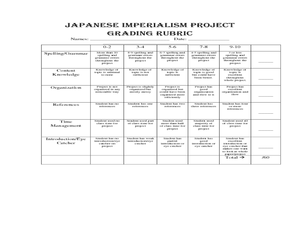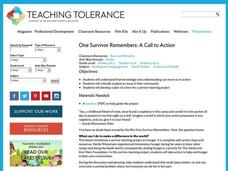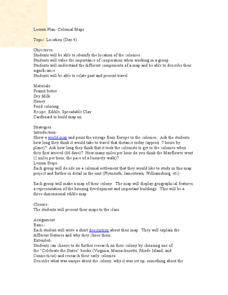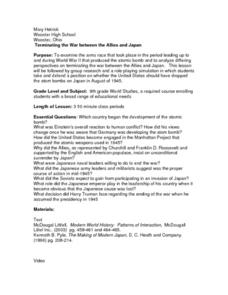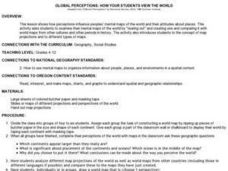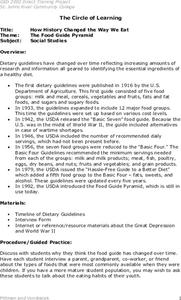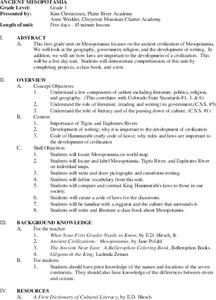Curated OER
The Japanese Empire: The Beginning
Ninth graders explore empires by researching Japan's history. In this Japanese research lesson, 9th graders discuss the history of Japan and the elements of World War II that caused Japan to become an enemy of the United States. Students...
Curated OER
WW II Magazine
Eleventh graders search the database for pictures of WW II, photographs, posters, etc. They use the documents to support writing two magazine articles. The magazine articles be a minimum of 500 and maximum 1000 words.
Curated OER
Grandfather's Journey
Third graders explore world cultures by reading a children's story in class. In this Japanese heritage lesson, 3rd graders read the book Grandfather's Journey and identify the characters, setting and plot that takes place. Students...
Curated OER
All About Me Museum
Learners investigate the concept of self-esteem and image with the creation of a personal display of items of significance. They put together a project composed of pictures and writings to describe themselves and are assessed according...
Curated OER
Exploration and Encounters
Fourth graders research explorers of the New World. In this American history lesson, 4th graders conduct internet & textbook research about various New World explorers. Students compare and contrast the sources used for...
Curated OER
ONE SURVIVOR REMEMBERS: A Call to Action
Students explore how to become active in their communities and develop a plan of action for a service-learning project.
Curated OER
Donner Online
Fourth graders participate in a simulation of the Donner Party in order to learn more about this episode in history. In this social studies lesson, 4th graders take on a role which dictates their group job; each role was assigned to...
Curated OER
Geography: Intro to Canada
Young scholars investigate the geography of Canada by analyzing a map of the country. In this North American geography lesson, students identify the 13 provinces of Canada and their locations by examining a Canadian map. ...
Curated OER
Colonial Maps
Students discover the history of America by identifying the traditional colonies. In this U.S. history lesson, students examine a world map and identify where the voyagers left from Europe to arrive at the United States. ...
Curated OER
Civil War: Generals at the Battle of Stones River
Students explore U.S. history by creating a computer presentation in class. In this Civil War battle lesson plan, students read assigned text about the Battle of Stones River and research individual generals from the battles. Students...
Curated OER
Terminating the War between the Allies and Japan
Ninth graders examine the arms race that took place in the period leading up to and during World War II that produced the atomic bomb. They analyze differing perspectives on terminating the war between the Allies and Japan. They ...
Curated OER
Virtual Colony Project
Students develop strategies to create a successful colony by analyzing the environment, individual rights, and responsibilities. They gain an understanding of the challenges faced by colonists.
Alabama Learning Exchange
The Five Senses: How They Relate to our World
Students explore the five senses and the significance of each sense. In this five senses and diversity lesson, students listen to You Can't Smell a Flower With Your Ear by Joanna Cole and take a walk observing opportunities to use all...
Curated OER
Foods and Languages of the World
Students learn about the foods of Italy. In this Italy activity, students learn about the different types of food from Italy, create their own pizzas using paper and markers, share their pizzas with the class, and go to the cafeteria and...
Curated OER
Food and Languages of the World
Third graders become familiar with the German pickle, part of the Christmas celebration in Germany. In this German pickle lesson, 3rd graders listen to the story of the German pickle and its significance to the German Christmas...
Curated OER
Global Perceptions: How Your Students View the World
Students examine their own perceptions and attitudes about places around the world. Using their mental maps, they compare and contrast it with a world map from different periods in history. They review the various types of map...
Curated OER
Breads Around the World
Pupils read about bread. For this lesson studying bread, students read about the history of bread and it's significance around the world. Pupils identify the three main crops used to make bread and ten common types of bread from...
Curated OER
First Peoples Project
Students participate in this project to connect the indigenous groups of the world. They create a calendar with their artwork with the hope new ideas can be exchanged between groups.
Curated OER
Introduction to Computing and Project Development
Students use a computer and math to complete a science project. They review a brief history of computers as well as information on different operating formats will be included. In addition, students complete an overview of the hardware...
Curated OER
IMF/World Bank - World Bank & IMF Lesson Plan
Students study international organizations and their purposes and functions in the world.
Curated OER
How History Changed the Way We Eat
Students participate in a lesson that is concerned with the history of the food pyramid and how it evolved and changed into its modern state. After being presented with the information they conduct classroom discussions about the research.
Curated OER
Family Heritage Project
Ninth graders research their own family history and relate their own personal history to world events. Each student analyzes reasons why people immigrate, by using their own family history. They also explore immigrants' contributions to...
Curated OER
Where It All Began: Sault Ste. Marie's Role in Michigan's History
Fourth graders will produce a Power Point presentation for Michigan Week on Sault Ste. Marie's role in Michigan history. The students will do research using a variety of written sources as well as the Internet and e-mail to gather...
Curated OER
Ancient Mesopotamia
Students locate ancient Mesopotamia on a map. They examine the religion, government and the development of writing. They write and draw pictographs and cuneiform writing. They create a class book based on their investigations.
